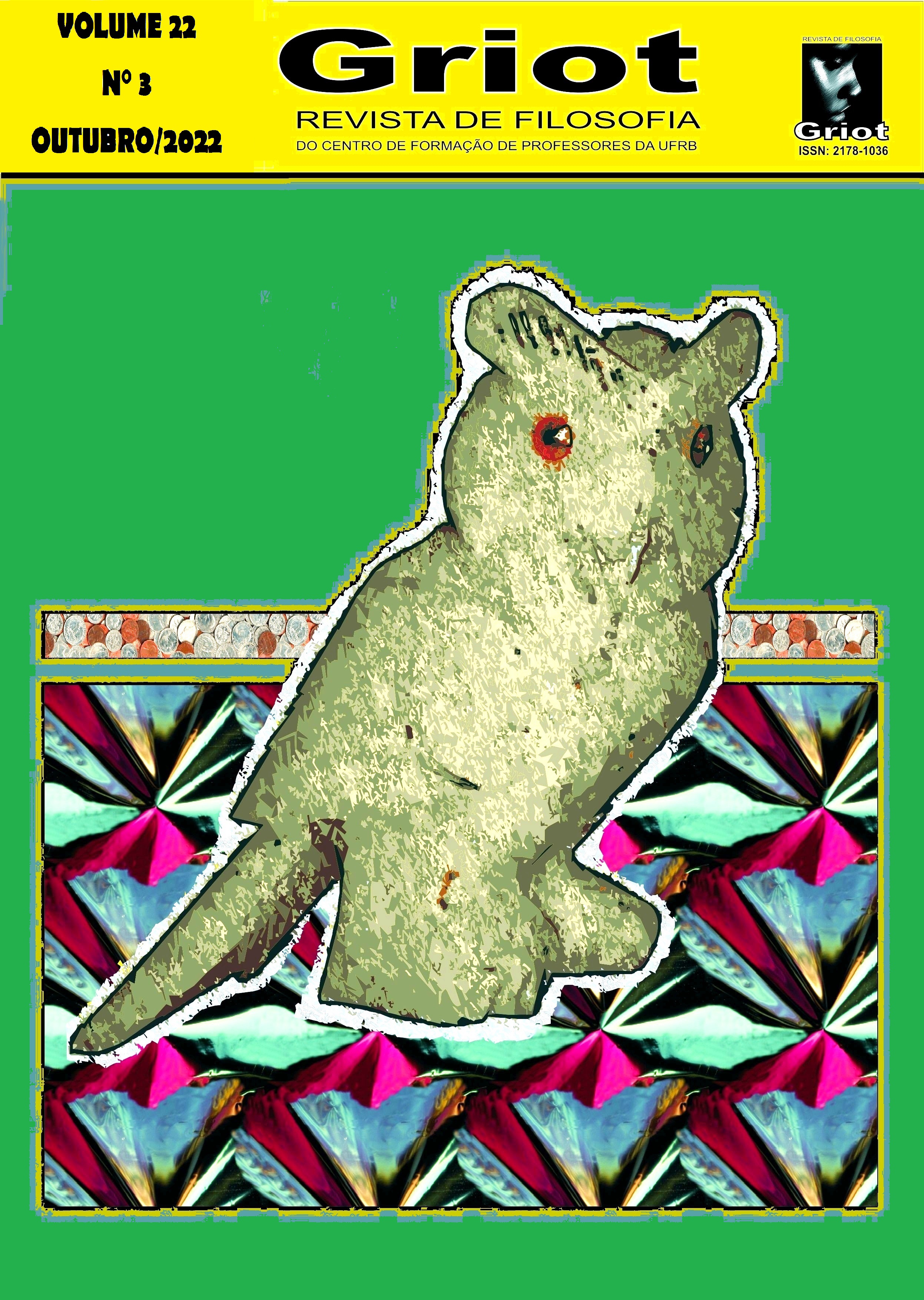Homo sacer’s empirical figures: approaches to the neoliberal phenomenon
DOI:
https://doi.org/10.31977/grirfi.v22i3.2934Keywords:
Agamben; Biopolitics; Homo sacer; Neoliberalism; Exception; Homo oeconomicus.Abstract
This paper propose a reading and application of the homo sacer metaphysical concept, central to the Giorgio Agamben thought. Thus, aims to debug from historical, social and political contexts empirical figures who reflect fundamental bare life features, extending the application of that paradigm. Therefore, is needed to consider some criticism – exposed in the introduction of the work – to the Agamben’s thought, which guide the enterprise, however without to depart absolutely from agambenian framework, but providing a new breath to his philosophical constructions. Basically, will be worked with three critical authors: Judith Butler, Thomas Lemke and Ludueña Romandini. With this in mind, propose a reading mode of the homo sacer paradigm that allows more precisely analysis of facticity, ensuring sensitivity to biopolitical nuances in their specific contexts – in other words, avoiding that the entire social body be reduced to the nuda vita sacredness. In the first section two figures is debugged: the national minorities, from Hannah Arendt political analysis; and the undefined inmates of Guantanamo Bay, investigated by Judith Butler. In a second moment, has the intention to approximate the neoliberal economic reason to the exception paradigm and to extract a new empirical figure of homo sacer, the homo oeconomicus, or enterprising subject. Finally, it is evidenced the neoliberal consequences, of that economic way of life, to the Agamben’s philosophical-political proposes, i. e., the implementation of an inoperative community and politics. Furthermore, the consequences to the actual democracy and the limitations of agambenian framework for such political context.
Downloads
References
ARENDT, Hannah. Origens do Totalitarismo. 8ª reimp. São Paulo: Companhia das Letras. 2012;
AGAMBEN, Giorgio. Homo Sacer: O poder soberano e a vida nua. 2ª reimp. Belo Horizonte: Ed. UFMG. 2007;
AGAMBEN, Giorgio. Homo Sacer: O que resta de Auschwitz. 1ª ed. São Paulo: Boitempo. 2008;
AGAMBEN, Giorgio. Homo Sacer: Estado de Exceção I e II. 6ª reimp. São Paulo: Boitempo. 2018;
AGAMBEN, Giorgio. Homo Sacer: O Uso dos Corpos. 1ª ed. São Paulo: Boitempo. 2017a;
AGAMBEN, Giorgio. Homo Sacer: O Reino e a Glória: Uma genealogia teológica da economia e do governo. 2ª reimp. São Paulo: Boitempo. 2016;
AGAMBEN, Giorgio. Meios sem Fim: Notas sobre a Política. 3ª reimp. Belo Horizonte: Ed. Autêntica. 2017b;
AGAMBEN, Giorgio. Signatura Rerum: sobre o método. 1ª ed. São Paulo: Boitempo. 2019;
BUTLER, Judith. Vida precária: os poderes do luto e da violência. Belo Horizonte: Autêntica. 2019;
BUTLER, Judith. Corpos em Aliança e a política das ruas: notas para uma teoria performativa de assembleia. 3ª ed. Rio de Janeiro: Civilização Brasileira. 2019b;
BUTLER, Judith. Quadros de Guerra: Quando a vida é passível de luto? 5ª ed. Rio de Janeiro: Civilização Brasileira. 2018;
BUTLER, Judith; SPIVAK, Gayatri C. Quem canta o Estado-nação? Língua, política, pertencimento. 1ª reimp. Brasília: Editora Universidade de Brasília. 2020.
CASTRO, Edgardo. Introdução a Giorgio Agamben: Uma arqueologia da potência. 2ª reimp. Belo Horizonte: Ed. Autêntica. 2016;
DARDOT, Pierre; LAVAL, Christian. Comum: ensaio sobre a revolução no século XXI. 1ª ed. São Paulo: Boitempo. 2017;
DARDOT, Pierre; LAVAL, Christian. A nova razão do mundo: ensaio sobre a sociedade neoliberal. 1ª ed. São Paulo: Boitempo. 2016;
DUARTE, André de Macedo. Biopolítica e Soberania em Foucault: uma resposta às críticas de Agamben e Esposito. In: Guilherme Castelo Branco; Helton Adverse. (Org.). Clássicos e Contemporâneos em Filosofia Política. 1ed. Rio de Janeiro: Relicário, 2015, v.1, p. 113-126.
DUARTE, André de Macedo. A pandemia e o pandemônio: ensaio sobre a crise da democracia brasileira. Rio de Janeiro: Via Verita. 2020;
DUARTE, André de Macedo. Heidegger e a linguagem: do acolhimento do ser ao acolhimento do outro. Natureza Humana. São Paulo, v. 07, n.1, p. 129-158. 2005;
FOUCAULT, Michel. Em defesa da sociedade. 3ª reimp. São Paulo: Ed. WMF Martins Fontes. 2018;
FOUCAULT, Michel. Microfísica do poder. 6ª ed. Rio de Janeiro: Ed. Paz e Terra. 2017;
FOUCAULT, Michel. A Arqueologia do Saber. 8ª ed. Rio de Janeiro: Ed. Forense Universitária. 2017;
FOUCAULT, Michel. Segurança, Território, População. São Paulo: Martins Fontes. 2008;
FOUCAULT, Michel. Nascimento da Biopolítica. São Paulo: Martins Fontes. 2008b;
GIACÓIA, Oswaldo. Violência e racionalidade jurídica. In. Revista Brasileira de Estudos Políticos, Belo Horizonte, n. 108, pp. 243-291, jan./jun. 2014;
GIACÓIA, Oswaldo. Agamben: Por uma ética da vergonha e do resto. São Paulo: n-1 edições. 2018;
LEMKE, Thomas. Biopolítica: críticas, debates, perspectivas. São Paulo: Politeia. 2018;
MBEMB, Achille. Necropolítica: biopoder, soberania, estado de exceção, política da morte. Rio de Janeiro: Revista Arte e Ensaios. 2016, n° 32, p. 122-151;
PAUL, Diane B. Darwin, social darwinism and eugenics. In: The Cambridge Companion to Darwin. 2ª ed. Cambridge: University Printing House. 2009;
ROMANDINI, Fabián Ludueña. A comunidade dos espectros. I. Antropotecnica. Florianópolis: Cultura e Barbárie. 2013. E-book.
Downloads
Published
How to Cite
Issue
Section
License
Copyright (c) 2022 Matheus Paiva

This work is licensed under a Creative Commons Attribution 4.0 International License.
The authors who publish in Griot: Revista de Filosofia maintain the copyright and grant the magazine the right of first publication, with the work simultaneously licensed under the Creative Commons Attribution 4.0 International License, allowing sharing and adaptation, even for commercial purposes, with due recognition of authorship and initial publication in this journal. Read more...









































































